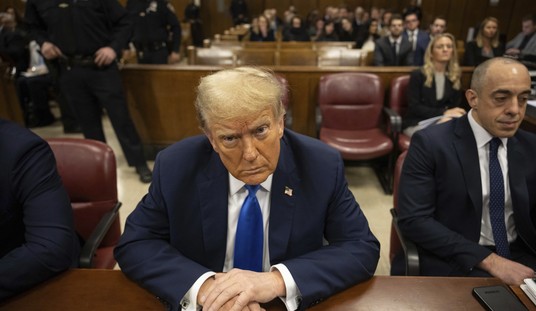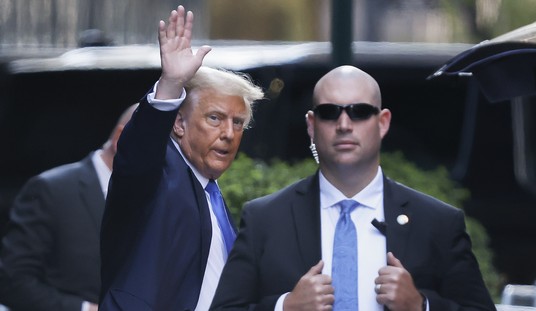The African-American poet Amiri Baraka (born Everett Leroi Jones) died yesterday. Already, the press is whitewashing — or should I say, in deference to the deranged late race hater, blackwashing — his real record of obscenity.
Leading the charge, naturally, is NPR, whose obituary tells us that he was “controversial,” and that he “co-founded the Black Arts Movement of the 1960s. His literary legacy is as complicated as the times he lived through, from his childhood — where he recalled not being allowed to enter a segregated library — to the 2001 attack on the World Trade Center. His poem about that attack, ‘Somebody Blew Up America,’ quickly became infamous.”
“Controversial” and “complicated” may be satisfactory to some of the network’s listeners, but even they could not ignore his most recent infamy — his poem after the attack on the United States on 9-11. NPR tells us Baraka “hurls indictments at forces of oppression throughout history,” and then prints some of the verses which indicate that what Baraka did was something else — indict the United States for being the real terrorist nation.
He was, in other words, a black Noam Chomsky who expressed in verse similar ideas as the noted radical linguist.
The following verse exemplified his belief that Jews knew in advance of the attack, and told their fellow religionists, and Israelis, to stay away:
Who knew the World Trade Center was gonna get bombed Who told 4000 Israeli workers at the Twin Towers To stay home that day
Why did Sharon stay away?Who? Who? Who?
That was too much for the state of New Jersey, which quickly removed his title as poet laureate of New Jersey — which they gladly handed him when he wrote even more offensive verses throughout his career.
The plaudits and prizes he received, indeed, show something deeply sick about American culture, as well as the American academy. He was a full professor at Stony Brook — SUNY, and had grants from the National Endowment for the Arts as well as the Guggenheim Foundation. No wonder NPR’s obit tells us his work was “achingly beautiful.”
Turning to the New York Times obituary, we learn that his Black Arts movement “ought to duplicate in fiction, poetry, drama and other mediums the aims of the black power movement in the political arena.” We also learn that “critical opinion” about Baraka was “divided,” which is one way of putting it. We also find out that “Mr. Baraka spent his early career as a beatnik, his middle years as a black nationalist and his later ones as a Marxist. His shifting stance was seen as either an accurate mirror of the changing times or an accurate barometer of his own quicksilver mien.”
Whatever he called himself — and he certainly blended black nationalism with Marxism — one thing was constant. He was a bitter, vile and open antisemite, who hated Jews over and above anything else he believed. The Times, of course, says only that his works “were periodically accused of being antisemitic, misogynist, homophobic, racist, isolationist and dangerously militant.”
Note that slippery word “accused,” with the implication that of course conservative, white and deluded right-wingers would make such a spurious charge. So they tell us his was a “powerful voice” and that he was a “riveting orator.” I guess the obit writer does not remember Adolf Hitler, about whom the same things could well be said, and who antisemitism was admired and equaled by Baraka. At least the obit included the judgment of Stanley Crouch — a black man who, like Baraka, wrote about jazz and blues, but who is the polar opposite of Baraka. Crouch said that his writing was “an incoherent mix of racism, antisemitism, homophobia, black nationalism, anarchy and ad hominem attacks relying on comic book and horror film characters and images that he has used over and over and over.”
His early work, learned critics tell us, had merit. But radicalized first by Fidel Castro and later by Malcolm X, the poet first known as Leroi Jones changed his name to Amiri Baraka, left his white Jewish wife and children, and started his rapid descent into madness. The Times goes on to tell us that once he became a Marxist-Leninist-Maoist, he renounced antisemitism. This judgment, of course, is a charade, as the 9/11 poem makes quite clear.
Thanks to the writer John-Paul Pagano, who concentrates on the issues of totalitarianism and antisemitic reactions to Israel and modernity, we have a complete recent list of his various tweets and comments about Jews. Here are some of the choice ones from Mr. Pagano’s compilation:
Smile, jew. Dance, jew. Tell me you love me, jew…I got the extermination blues, jewboys. I got the hitler syndrome figured”
… a nigger wants to put down the Zionist and the Zionists control the radio, the television, the movies, the education…
“[the Jewish radicals] get niggers to fight harder for them than they fight for niggers… to die to see Jews get … power”
“Selling fried potatoes and people, the little arty bastards talking arithmetic they sucked from the arab’s head…” –
“The Fag’s Death / [the Jews] give us on a cross. To Worship… a dead jew… mad chains of dead jews…”
“…not even the courage to kill myself… Just be herded off like a common jew, and roasted in my teary denunciations.”
So where did the great poet and writer go for treatment, hoping to fend off death and get the best doctors? Thankfully, as the Times’ obituary informs us, “his death, at Beth Israel Medical Center, was confirmed by his son Ras Baraka, a member of the Newark Municipal Council.”
I hope Mr. Baraka does not rest in peace.
******
Cross-posted from Ron Radosh’s blog







Join the conversation as a VIP Member